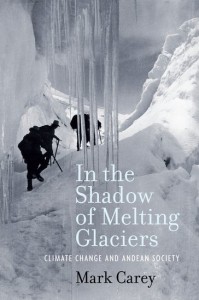Environmental historians and historians of science have a particularly valuable role to play in studying climate. For one, climate (and weather) have been potent forces in human history, even if historians are only just beginning to understand these dynamic environmental forces. Of course climate never acts alone, as traditional climatic determinism theories might have suggested. But we are learning all the time how much climate was a factor in historical processes, as the excellent work covered by the Climate History Network demonstrates.
Yet historians of climate should not just be focused on the past. Human-climate interactions have always been important for societies, and historians ought to be much more involved in ongoing global climate change discussions, as Carey has suggested in his own publications and in a special issue Forum on Climate Change and Environmental History of the journal Environmental History that he co-edited with Philip Garone. Historians can provide relevant past examples of climate adaptation and maladaptation. They can analyze the history of climate science, demonstrating for example how Cold War geopolitics fueled climate science in the Polar Regions, or how everyday residents understand climatic conditions in different periods and places. They can uncover diverse unique climate sources to understand past climatic conditions—after all, scientists studying climate change always look to the past to understand the future.
Historians can help contextualize current debates about global warming. And perhaps most importantly, historians studying climate can illustrate how, ultimately, climate is as much cultural and social as it is about the physical characteristics of temperature and precipitation. Until we recognize and embrace the cultural dimensions of climate, our societies are unlikely to do much to address climate change impacts.